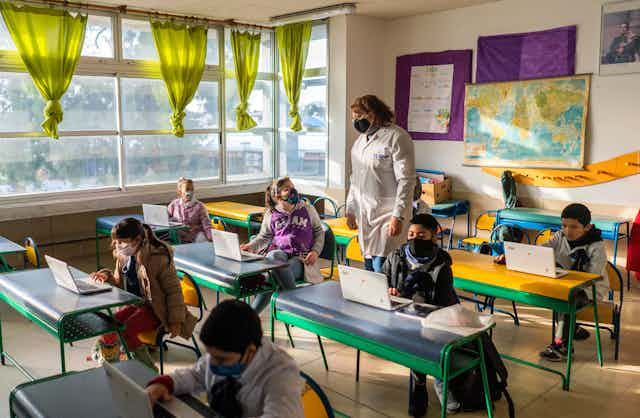Ingenious Solutions to Save Temecula Schools from Budget Cuts
Wiki Article
Understanding the Value of Institutions in Kid Development and Neighborhood Growth
Institutions' interaction with local communities with service-learning efforts enhances the bond between households and educational institutions. This symbiotic connection emphasizes the relevance of institutions in supporting energetic citizenship and lifelong knowing behaviors.Academic Accomplishment
Academic success functions as a cornerstone of child advancement, providing the structure whereupon future discovering and success are developed. Institutions play a pivotal duty in promoting this academic growth, providing structured atmospheres where children can acquire important expertise and cognitive skills. Standardized curricula ensure that pupils gain effectiveness in core subjects such as maths, scientific research, and language arts, which are crucial for both higher education and learning and professional chances.Along with passing on basic scholastic abilities, colleges likewise cultivate crucial reasoning, problem-solving capacities, and intellectual curiosity. These cognitive competencies are essential for navigating complicated real-world scenarios and adjusting to the ever-evolving demands of the modern office. Educators, as facilitators of knowing, employ varied instructional techniques to cater to diverse discovering designs, thereby optimizing individual student capacity.
Furthermore, scholastic success is very closely connected to self-worth and inspiration. Children who experience scholastic accomplishments are more probable to create a positive self-concept and a long-lasting enthusiasm for discovering. Colleges additionally provide various resources, such as collections and modern technology, which better boost the instructional experience and prepare students for a technically sophisticated society.
Social Skill Growth
Beyond academic accomplishment, the function of schools in social skill development is indispensable. Schools work as a key place for youngsters to find out and practice necessary social skills such as collaboration, conflict, and communication resolution. In the structured environment of a classroom, trainees connect with peers, educators, and various other school team, using many opportunities to develop these crucial capabilities.Effective social ability development in colleges is assisted in with team activities, collaborative tasks, and extracurricular programs. These interactions assist students recognize social standards, construct compassion, and cultivate a sense of neighborhood. Team tasks teach trainees exactly how to function together in the direction of a typical objective, pay attention to different point of views, and navigate disputes constructively.

The farming of social abilities during school years lays a structure for future personal and specialist connections. Save Temecula Schools. As pupils develop, the ability to successfully work together and communicate comes to be increasingly essential, emphasizing the college's important duty in all natural kid advancement
Direct Exposure to Variety
Exposure to variety in schools is fundamental to fostering an inclusive mindset and expanding pupils' viewpoints. Schools act as a microcosm of the wider society, and coming across varied societies, languages, and socioeconomic backgrounds within this setting equips pupils with important skills for browsing a significantly globalized globe. This direct exposure motivates compassion, lowers bias, and advertises common regard amongst peers.Study suggests that pupils who interact with peers from different histories exhibit far better analytical abilities and imagination. This understanding of diversity prepares students for future offices that value multicultural skills - Save Temecula Schools.

Neighborhood Engagement
The advantages of diverse classrooms expand beyond the institution wall surfaces, cultivating a solid feeling of neighborhood involvement among students. By communicating with peers from different social, socioeconomic, and ethnic histories, pupils obtain a more comprehensive perspective and an admiration for diversity. This exposure description encourages them to become energetic residents who want to contribute positively to their neighborhoods.Schools that emphasize community interaction frequently incorporate service-learning projects, which permit pupils to address real-world problems while using scholastic skills. These tasks not only enhance students' understanding of their coursework yet additionally infuse a sense of obligation and empathy. Moreover, collaborations between institutions and local companies give pupils with possibilities to take part in neighborhood events, better solidifying their function as proactive area participants.
Furthermore, parental and area involvement in schools enhances the my blog bond in between instructional institutions and the areas they offer. Through these efforts, institutions play a critical function in supporting community interaction and fostering social growth.
Lifelong Knowing Practices
Developing lifelong knowing practices is important for a kid's constant development and adaptability in an ever-changing world. Institutions play an essential function in instilling these routines by developing a setting that promotes interest, important reasoning, and a love for understanding. With extracurricular activities and diverse curricula, educators encourage students to explore different subjects, examine info critically, and apply their learning to real-world situations.
Moreover, institutions give a structured atmosphere where children can establish self-control and time management skills, both of which are critical for constant knowing. By highlighting the importance of setting goals, reviewing progress, and adjusting methods, instructional institutions prepare trainees to navigate the intricacies of adult life, guaranteeing they continue to be long-lasting students and contributors to society.
Final Thought
In conclusion, schools are necessary in cultivating youngster development and area development by providing environments for scholastic achievement, social ability growth, and direct exposure to variety. Through collaborative projects and interactions, schools enhance crucial thinking, compassion, and interaction abilities. Neighborhood interaction try this site initiatives additionally enhance the bond between neighborhood areas and instructional organizations. Inevitably, colleges grow lifelong discovering practices, gearing up people with the needed understanding and skills to contribute favorably to culture.In the organized environment of a class, pupils interact with peers, instructors, and various other college personnel, supplying many opportunities to develop these important capabilities.
In essence, exposure to diversity within institutions not just enriches individual pupils but likewise enhances the social textile of the area as a whole.
The benefits of diverse class expand past the college wall surfaces, cultivating a strong feeling of neighborhood engagement amongst students.Schools that highlight neighborhood involvement commonly include service-learning projects, which allow trainees to address real-world issues while using scholastic abilities. Partnerships between schools and local organizations give students with chances to take part in neighborhood occasions, further solidifying their role as proactive community members.
Report this wiki page